Scaling up Rainforest Alert
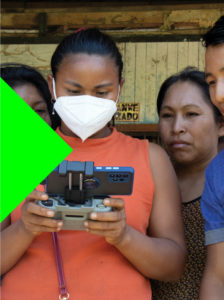 This year Rainforest Foundation US expanded Rainforest Alert, our technology-based forest patrol program (known within the scientific community as “community monitoring”). By equipping indigenous forest patrollers with state-of-the-art, affordable technology, they can detect and document deforestation on their lands, which can in turn influence law enforcement and policymakers to intercede on their community’s behalf.
This year Rainforest Foundation US expanded Rainforest Alert, our technology-based forest patrol program (known within the scientific community as “community monitoring”). By equipping indigenous forest patrollers with state-of-the-art, affordable technology, they can detect and document deforestation on their lands, which can in turn influence law enforcement and policymakers to intercede on their community’s behalf.
Learn more about how Rainforest Alert works.
In 2021 we spearheaded the expansion of Rainforest Alert from three to twenty communities, establishing forest stewardship of over 540 square miles (over 140,000 hectares) of Amazonian territories. This program expansion trained over 60 forest patrollers in the Loreto and Ucayali regions of Peru.
We estimate that our Rainforest Alert program could prevent nearly 4,000 square miles (1 million hectares) of deforestation over the coming decade—that’s twice the size of Delaware.
A Program Founded on Evidence
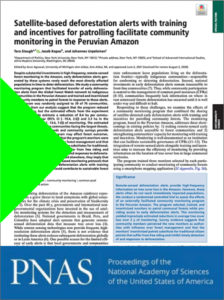 In the coming years, we hope to bring hundreds of communities into our Rainforest Alert program. But we wouldn’t be expanding so aggressively if we didn’t have evidence that it works.
In the coming years, we hope to bring hundreds of communities into our Rainforest Alert program. But we wouldn’t be expanding so aggressively if we didn’t have evidence that it works.
That evidence arrived this July. Over the last several years, Rainforest Foundation US worked with partners in the Peruvian Amazon while a team of scientists studied our Rainforest Alert methodology.
The results were astounding. A peer-reviewed scientific study, published in Proceedings of the National Academy of Sciences found that indigenous communities applying the Rainforest Alert program methodology lost 52% less forests
than control groups in the first year alone.
Extrapolating from those results, our analysis shows that expanding Rainforest Alert across the Amazon could reduce carbon dioxide emissions from deforestation by the equivalent of taking 21 million cars off of the road. That’s not all: we can do it cost-effectively, at only $6 per hectare a year.
Protecting Traditional Land
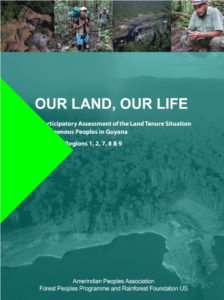 In 2021, the Amerindian Peoples Association (APA), in partnership with Rainforest Foundation US and the Forest Peoples Programme, published an evidence-based report on indigenous peoples’ land tenure in Guyana. As a culmination of eight years of participatory research, the report identifies key threats to indigenous people’s territories such as: inadequate recognition of customary lands, land conflicts, and mapping problems. We helped produce recommendations based on interviews from 85 villages.
In 2021, the Amerindian Peoples Association (APA), in partnership with Rainforest Foundation US and the Forest Peoples Programme, published an evidence-based report on indigenous peoples’ land tenure in Guyana. As a culmination of eight years of participatory research, the report identifies key threats to indigenous people’s territories such as: inadequate recognition of customary lands, land conflicts, and mapping problems. We helped produce recommendations based on interviews from 85 villages.
This report will be key in the battle for greater territorial recognition, as well as the battle against illegal land-grabbing. By documenting the historic occupation and sacred significance of these landscapes, we are helping build a case for continued and expanded territorial recognition. Together with Rainforest Foundation Norway and Nia Tero—and with support from the Government of Sweden—we’re rolling out large-scale land rights claims for indigenous peoples’ lands in the country’s Mazaruni, Rupununi and Pakaraimas regions.
Learn more about the report here.
COVID-19 Relief
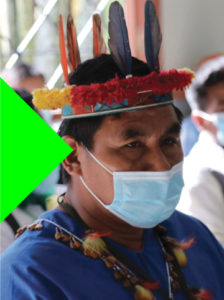 Since March 2020, we’ve co-sponsored an alliance of over 35 nonprofit and indigenous peoples’ organizations working to bring emergency support to indigenous communities across nine countries of the Amazon basin. Together with our partners we raised $3 million and funded community led projects that:
Since March 2020, we’ve co-sponsored an alliance of over 35 nonprofit and indigenous peoples’ organizations working to bring emergency support to indigenous communities across nine countries of the Amazon basin. Together with our partners we raised $3 million and funded community led projects that:
- Brought emergency medical aid to remote communities;
- Supported food and natural medicine production;
- Distributed personal protective equipment and medicine;
- Developed income generating activities.
As a silver lining of the pandemic, we strengthened long-term partnerships with organizations like the Coordinating Body of Indigenous Peoples of the Amazon Basin (COICA) and identified new allies working to protect indigenous ways of life and the rainforest we all depend on.
Support to Central American Forest Guardians
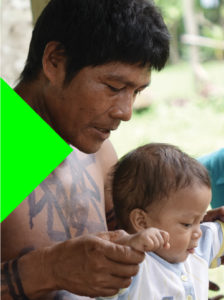
Together with the Mesoamerican Alliance of Peoples and Forests (AMPB), Rainforest Foundation US launched a new project to bolster sovereignty of local indigenous peoples’ organizations in Mexico and Central America. Amongst other things, the project will help AMPB register as a legal entity, allowing it to better support threatened national indigenous leaders—a problem that pervades the indigenous peoples’ rights movement in the region. It will also provide support to channel finance to territories, enhance women’s coordination, and strengthen capacities for territorial governance. This is Rainforest Foundation US’s first USAID grant, and portends an aggressive expansion of our partnerships north of the equator.
Learn more about this project.
PDF Download





